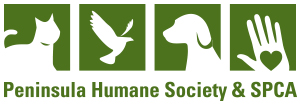Frequently Asked Questions
Why do you have an adoption process?
Our counselors take great care to explain what adopters can expect and match needs and energy levels of animals with the adopter’s lifestyle. The process is an educational opportunity, not an interview, and our goal is to make as many matches as possible. We average more than 3,000 adoptions per year!
What's included in an adoption?
Dogs and cats receive health and temperament screening, initial vaccinations, a microchip, free vet visit with a participating vet, and spay/neuter surgery. Rabbits receive everything but a microchip. For varying adoption fees, small animals and exotic pets also receive health and temperament screening and a free vet visit. Adopters can make an appointment with our vet, should a medical issue arise within 14 days of the day they adopted.
Does PHS/SPCA euthanize animals?
Because we accept all animals and in varying conditions, many simply cannot go up for adoption because they are too aggressive, too sick, badly injured, or too young to survive in a shelter. We do, however, adopt 100% of healthy (physically and behaviorally) dogs and cats. The animals we euthanize are animals no other shelter or rescue group is willing or able to take, and they are euthanized only when all options have been exhausted.
How long do animals stay at PHS/SPCA?
What can I do if I suspect someone of animal abuse?
Can PHS/SPCA handle my nuisance wildlife?
I've lost my animal. What can I do?
Is PHS/SPCA private or public? How is the shelter funded?
When is PHS/SPCA open?
How can I help the animals?
Can I bring the stray cats on my property to PHS/SPCA? What will happen to them?
If your property is within San Mateo County, yes- you may bring the stray cats on your property to us. Cats are held for at least four days to give owners a chance to claim them, then given a health check and a temperament evaluation to see if they can go up for adoption.
Do I have to give a year commitment if I want to volunteer?
Because we spend a great deal of time training volunteers, we ask for a year commitment and for volunteers to commit 2-4 hours per week, depending on the department.
Can my child volunteer at PHS/SPCA?
We offer volunteer positions for youth 13 to 17 years of age and require a commitment of 2 hours per week for at least six months. Children ages 13-15 must volunteer with a parent or guardian. Click here for more information.
Can an animal control officer return my pet if the animal has identification?
Can I buy an animal license at PHS/SPCA? Do you microchip and vaccinate animals?
Yes, yes and yes! You can purchase a license or microchip form of ID from our front office any day, except major holidays, no appointment needed. Click here for more information. If your animal needs vaccinations, you can make an appointment at our our low-cost clinic. We offer Rabies, FVRCP and DHPP for $15 each; we also sell microchips at a reduced cost. Click here for more information.
Do your officers do more than pick up strays?
Does PHS/SPCA adopt Pit Bulls?
Why does PHS/SPCA spend money on programs that don't involve direct care of shelter animals?
While one goal is to care for stray and unwanted animals, another is to address roots of problems: cruelty, neglect and overpopulation. We provide education for schoolchildren, a free Pet Loss Grief Support group, obedience classes, and a free Behavior Helpline at 340-7022 ext. 183 or, en Espanol ext. 186. These are some of the programs and services that make us a humane society and much more than a pound. For more information about these programs, see the “Our Work” section of our web site.
What kind of animals are available for adoption and how often do they change?
Can I do anything for a family member of friend who is grieving the death of a loved companion animal?
Yes, please refer them to our Pet Loss Support Group which meets the second Thursday evening of each month via Zoom. It is led by a professional facilitator and designed to help those who need support beyond that which they are receiving from family and friends. For the next meeting date, please call 650-340-7022 ext. 344. Click here for more.
